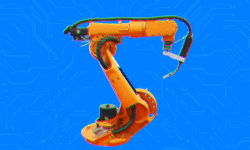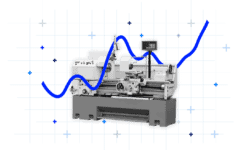Semiconductors power nearly every facet of modern life, from the devices we use daily to the advanced infrastructure driving global industries—data centers, cloud computing, and AI systems.
Over the past half-decade, artificial intelligence has been completely transforming the semiconductor industry. The first wave of rapid change occurred during the COVID-19 pandemic, when the sudden rise of remote work and sharp increase in the use of consumer electronic devices led to a massive spike in demand for semiconductor chips (accompanied by worldwide supply chain disruptions).
Today, another cutting-edge emerging technology is driving a second wave of high demand: generative AI (genAI). The development and deployment of genAI models require immense computational power, far exceeding that of traditional applications. As a result, the need for high-performance semiconductors—in particular, GPUs and AI-specific processors—has surged.
Advanced chips are essential for training and running large-scale AI models, creating new pressures on chip manufacturers to keep pace with this rapidly growing sector.
Beyond driving higher demand, generative AI is also opening up new opportunities and transforming adjacent industries. Data centers are expanding their infrastructures to manage greater computational loads, while suppliers, including silicon mining companies, are ramping up their efforts to meet the growing need for chip production.
Electric and infrastructure providers are facing new challenges as energy consumption rises to power AI workloads. At the same time, major OEMs and big tech companies are exploring custom chip designs to reduce dependence on external suppliers like NVIDIA, whose dominant position in the AI chip market has given them nearly unilateral pricing power.
Today’s genAI boom is driving a more profound transformation in the semiconductor industry than the one experienced at the start of the 2020s. This shift extends beyond increased demand and is reshaping the global technology ecosystem, influencing everything from supply chains to infrastructure and innovation across sectors.
Opportunities GenAI Brings to the Semiconductor Industry
GenAI brings unprecedented possibilities and new use cases across the semiconductor value chain, from planning and R&D to operations, pre-sales, and ongoing innovation. It’s enabling companies to innovate faster, optimize resources, and identify opportunities to maintain a competitive edge in increasingly demanding markets.
Supply Chain Forecasting
GenAI can manage supply chains with unparalleled precision. By analyzing vast datasets around market trends, production cycles, geopolitical factors, and more, artificial intelligence can accurately forecast demand, enabling semiconductor companies to optimize inventory and assess risk with confidence. In turn, they’re able to anticipate and mitigate disruptions and remain resilient in changing markets.
For example: The ability to predict raw material shortages (like those experienced during the pandemic) well in advance would enable companies to proactively allocate resources to avoid costly delays, keeping production lines running smoothly amidst fluctuating demand.
Manufacturing
GenAI in manufacturing encompasses a number of high-impact applications. It can execute predictive maintenance by identifying patterns in machine data, which detect potential failures in manufacturing processes and equipment before they occur, reducing downtime and repair costs.
GenAI enables the creation of digital twins—virtual replicas of physical assets or processes. By using generative AI algorithms for real-time data analysis from sensors and other sources, manufacturers can create accurate digital representations of their products, production lines, or entire factories. Digital twin technology powered by genAI provides chip manufacturers with valuable insights and the ability to make informed decisions to improve efficiency and productivity.
AI-driven automation also enhances quality control, ensuring fewer defects and higher yields in production. As chip suppliers race to meet new manufacturing industry trends and the growing needs of AI applications, genAI-enabled efficiencies will be crucial for maintaining competitive lead times and reducing production costs.
R&D
GenAI is revolutionizing semiconductor research and development by accelerating discovery of new materials and processes. AI algorithms, simulations, and predictive models allow engineers to test and validate new chip architecture at a scale and speed previously unattainable. This both reduces the time required to experiment with new materials and cuts cost by minimizing trial and error.
For example, IBM’s Multi-Modal Foundation Model for Material Discovery integrates conversational genAI to streamline the research process, allowing engineers and researchers to interact with AI using natural language, making material discovery more intuitive and efficient.
By using AI to analyze and simulate various material properties, the model helps researchers rapidly identify and test new materials, significantly reducing the need for physical experimentation, accelerating the discovery process, and minimizing costs associated with traditional trial-and-error methods.
Design Generation
In chip design, genAI is enabling faster and more efficient creation of complex architectures. AI can evaluate design iterations based on specific performance criteria, optimizing power efficiency, thermal management, and processing speed.
In turn, engineers can focus on higher-level innovation (and deliver greater value) while AI handles the repetitive, labor-intensive aspects of the design process.
One key example is Synopsys’ recently launched Synopsys.ai Copilot, a tool specifically designed to streamline chip design processes. Developed through a strategic collaboration with Microsoft, Synopsys integrates Azure’s OpenAI service into its industry-leading electronic design automation (EDA) suite.
It accelerates time-to-market by automating tasks across the chip development lifecycle—from system architecture exploration to detailed design and manufacturing—while utilizing scalable AI infrastructure to handle the ever-increasing complexity of semiconductor design.
Unprecedented Demand
The advent of generative AI has skyrocketed demand for semiconductors, as companies across all industries are leveraging this technology to process greater quantities of data and run advanced AI models. With the growth of computational demands of modern-day companies, the semiconductor industry has experienced unprecedented growth in tandem.
The widespread use of genAI has also led to the expansion of data centers, which also require semiconductor chips to function. Beyond centralized data centers, there is a growing trend of deploying AI at the edge—in devices like smartphones, autonomous vehicles, and industrial robots. These devices require specialized semiconductors, often with real-time processing capabilities. This has increased the demand for low-power, high-performance chips.
The push for more efficient AI applications has also led to a greater demand for specialized AI chips, such as AI accelerators and NPUs (neural processing units). The design and production of these specialized semiconductors has facilitated tremendous growth in the industry.
Innovation
Perhaps the most impactful way genAI is transforming the semiconductor industry is by accelerating innovation. By enabling faster design, more efficient manufacturing, and smarter R&D, genAI is driving the development of new types of semiconductors.
AI-driven chip design is paving the way for processors specifically tailored for edge computing, IoT devices, and AI workloads. This is critical for staying ahead in a rapidly evolving technology landscape, where the demand for specialized chips is only growing.
Companies that can leverage genAI to push the boundaries of chip performance and capability will be best positioned to lead in their markets going forward.
How GenAI is Impacting Key Industry Players
In response to genAI’s revolutionizing technological capabilities and market demand, key players in the semiconductor industry have revamped their strategies and business models. The companies adapting most proactively and effectively to the evolving genAI landscape will be the ones best able to maintain market share and lead in next-gen semiconductor innovation.
NVIDIA
As the most dominant global supplier of GPUs—essential for AI model training—NVIDIA is capitalizing on the growing demand for higher-performance computing. Their pricing power and long-standing market dominance place NVDIA in a unique position to influence the future of genAI, both in the semiconductor industry and across other sectors.
As other top industry leaders increase their investment in genAI technology, NVIDIA’s main challenge will be innovating to maintain their current competitive lead.
In this earnings call sourced from the AlphaSense platform, NVIDIA Corp discusses how generative AI is a fundamental new way of doing software, enabling new applications in areas like chatbots, productivity tools, and risk management.
TSMC
TSMC is the world’s largest contract chipmaker, producing advanced AI chips for industry giants such as NVIDIA and Apple. Their leadership in cutting-edge 5nm and 3nm process nodes have made them essential for manufacturing the complex chips that power genAI workloads. TSMC’s ability to deliver at scale makes them a linchpin in the ongoing AI revolution.
TSMC is currently expanding production capacity at its leading fabs to stay ahead of the surge in demand for AI-enabled chips and maintain their position in the global semiconductor supply chain.
According to this Q2 2024 earnings transcript sourced from the AlphaSense platform, TSMC is seeing very strong generative AI-related demand, which supports a structural increase in long-term market demand for energy-efficient computing. The company is employing a disciplined framework to address this increased demand by working closely with customers to plan its capacity.
Intel
Intel is adapting its business model to address the increasing demand for AI-specific processors. With its Xeon Scalable processors, designed for AI workloads, Intel is looking to regain its footing in the competitive AI space. Their focus on AI for data centers and cloud infrastructure, combined with vertically integrated manufacturing capabilities, enables Intel to pursue growth in AI markets, including cloud computing, autonomous systems, and data analytics.
According to a special call sourced from the AlphaSense transcript, Intel stated that generative AI technologies are seeing fast adoption among both consumers and enterprise users. The company has over 4,100 edge deployments for AI across 12 countries and serves over 40 million monthly uniques on applications built by its customers.
Texas Instruments
Texas Instruments (TI) is leveraging its expertise in analog and embedded processing to support the rise of AI in edge computing applications. Their chips are increasingly used in sectors like automotive and industrial IoT, where AI-driven systems are becoming essential. TI’s longstanding focus on power-efficient semiconductors positions them well to meet the growing demand for AI-powered edge devices.
Qualcomm
Qualcomm has been expanding its AI capabilities through its Snapdragon processors, optimized for edge computing and AI inference on mobile devices. Qualcomm is leveraging AI to enhance the performance of real-time decision-making systems in products like autonomous vehicles, smartphones, and IoT devices. By focusing their AI-driven innovation in mobile and edge computing, Qualcomm is establishing a niche role as a leader in sectors where real-time processing at the edge is critical.
According to a Q3 2024 conference transcript sourced from the AlphaSense platform, Qualcomm is leading the way in on-device generative AI, transforming how we engage with technology. The company is forecasting that at least 50% of PCs will be AI capable by 2027, and it expects to be positioned as one of the top silicon suppliers for these devices.
Samsung
Samsung has long been a major player in chip manufacturing and memory solutions, making significant investments in AI-driven semiconductors. Their focus on AI-specific memory chips and its advancements in AI-enabled manufacturing has allowed the company to serve the growing needs of AI applications as they’ve evolved, particularly in data centers and AI infrastructure.
Today, Samsung’s proven ability to optimize memory and high-density chips to align with AI capabilities has secured their continued relevance in the global semiconductor ecosystem.
According to this Q3 2023 Earnings Call sourced from the AlphaSense platform, Samsung is strengthening its market leadership in high-density, low-power, and high-performance products for on-device AI, which has attracted significant attention.
Broadcom
Broadcom’s focus on AI-driven infrastructure solutions places it at the center of the growing demand for AI-capable networking and data center technologies. Broadcom’s expertise in broadband, storage, and networking solutions enables faster data processing and transfer, essential for supporting the large-scale AI workloads being deployed globally.
As AI applications grow, particularly in cloud and enterprise environments, Broadcom’s infrastructure solutions will continue to be critical for scaling AI operations.
In this Q4 2023 Earnings Call sourced from the AlphaSense platform, Broadcom Inc. reported that generative AI revenue represented close to $1.5 billion or 20% of its semiconductor revenue in Q4 2023.
Infineon Technologies
Infineon Technologies is a leader in power semiconductors, with a strong market presence in automotive and industrial applications—two industries experiencing rapid genAI adoption. As genAI continues to power advancements in areas like electric vehicles, autonomous driving, smart factories, and industrial IoT, Infineon’s focus on delivering power-efficient semiconductors positions it to capitalize on the growing demand for AI-optimized systems.
MediaTek
MediaTek is a key player in mobile chipsets and is leveraging genAI to enhance real-time AI capabilities in smartphones and IoT devices. As demand for AI-driven applications like image recognition, speech processing, and augmented reality increases, MediaTek’s focus on integrating AI into its Dimensity series of processors allows it to deliver powerful, efficient AI performance at the edge.
This positions MediaTek to capture a growing share of the market for AI-driven mobile computing and consumer IoT devices, where genAI is becoming essential for enhancing user experiences through on-device processing.
Impact on Other Industries
As genAI is transforming the semiconductor sector, it’s also having ripple effects in other industries that depend on semiconductors, changing how they drive efficiencies, serve customers, and strategically innovate.
Big Tech
Companies like Apple, Google, Microsoft, and Amazon are aggressively scaling AI and machine learning integration across their products and services, driven by the success of large language models like ChatGPT. This is increasing global demand for AI-optimized chips—particularly GPUs and custom silicon.
NVIDIA’s dominance in this space has given it significant pricing leverage, which directly impacts the bottom line for big tech giants. As a result, these companies are investing heavily in custom chip development—Apple with its notoriously covert ACDC initiative and Google with TPUs, for example—to reduce dependency on third-party suppliers and control long-term costs.
Data Centers
Hyperscale data centers are at the heart of AI deployment, requiring high-performance chips to support large AI models like GPT-4. The computational intensity of these models is driving demand for specialized hardware like AI-specific GPUs and TPUs.
Simultaneously, the power and cooling requirements of these chips are creating pressure to innovate in energy efficiency and data center architecture. The need to balance performance with sustainability is becoming a central challenge.
Manufacturing and OEMs
GenAI is transforming semiconductor manufacturing through predictive analytics and precision automation, optimizing everything from yield to production timelines. AI-powered demand forecasting enables manufacturers to better anticipate market shifts, helping them reduce the risk of supply chain shortages by ensuring resources are allocated efficiently.
Simultaneously, the surge in demand for AI-specific chips is reshaping supply chains, leading to changes in wafer fabrication, component sourcing, and silicon mining, as manufacturers scale to meet this growing demand. TSMC, for example, is already scaling up plans for future A16 chip fabrication to meet demand from major players like Apple and OpenAI.
Related Reading: Generative AI in Manufacturing
Healthcare Industry
GenAI’s ability to analyze vast medical datasets for diagnostics and personalized treatment plans is pushing the need for advanced AI chip technology in the healthcare industry. AI-optimized semiconductors are essential for processing complex medical data in real-time, powering everything from genomic sequencing to AI-driven diagnostics to advanced imaging.
The increase in demand for edge computing in healthcare—such as wearables and real-time diagnostic tools—is directly tied to advancements in semiconductor technology that genAI depends on.
Related Reading: Generative AI in Healthcare
Cloud Computing
Leading cloud providers like AWS, Azure, and Google Cloud are feeling the effects of GenAI’s demand for specialized chips that power AI-as-a-Service offerings. The surge in AI workloads—especially those requiring massive parallel processing for large language models—is pushing cloud providers to redesign their infrastructure to accommodate the increased computational needs.
GenAI has also accelerated innovation in custom silicon within cloud infrastructure, driving demand for cutting-edge chips that can scale AI capabilities while balancing energy efficiency and cost-effectiveness.
Telecommunications
GenAI’s impact on the semiconductor industry is filtering into telecommunications as 5G deployments and IoT ecosystems require more powerful semiconductors. The rising need for real-time data processing in AI-enhanced network management and predictive maintenance is driving telecom providers to adopt AI-optimized chips—which help them manage increasing data flows and improve latency performance.
This is reshaping the way networks are built and maintained, creating an increasing dependence on the AI-capable semiconductors that genAI applications require.
Automotive Industry
The market for genAI in autonomous vehicles is growing at a rapid clip. Advanced driving assistance systems (ADAS) in these vehicles rely on real-time processing of vast amounts of sensor data, making AI chips critical for them to operate. Automotive-grade semiconductors have become central to the industry’s shift toward AI-driven features, with companies like Tesla and Waymo pushing the limits of in-vehicle computing power.
Any disruptions in semiconductor supply chains directly impact production timelines, underscoring the strategic importance of securing reliable access to AI-optimized chips.
Defense and Aerospace
Autonomous defense systems, unmanned vehicles, and satellite communications increasingly rely on real-time processing in ways similar to the automotive industry. But defense and aerospace also require radiation-resistant semiconductors capable of operating in extreme environments.
As AI becomes more central to defense and aerospace technologies, the semiconductor supply chain must evolve to meet the growing need for specialized, durable chips that can withstand harsh conditions while delivering high-performance computing for mission-critical applications.
Clean Energy
GenAI in the clean energy sector is critical to optimize smart grids, enhance energy storage systems, and improve the efficiency of renewable energy sources like wind and solar.
As GenAI advances semiconductor technology for real-time data processing and predictive analytics, energy companies are using it to manage complex energy infrastructures. Advanced AI-optimized chips are critical for energy forecasting, improving the integration of renewable energy into power grids, and reducing energy waste.
Stay Updated on GenAI Developments in the Semiconductor Industry
As genAI continues transforming the semiconductor industry—and influencing trends and technology demands in other sectors—staying informed about new developments is imperative for companies seeking to maintain a competitive edge.
With AlphaSense, you can track the latest trends and insights in real time. Our platform provides access to a wealth of industry data, expert analysis, and actionable intelligence, making it easy to stay informed on fast-moving industry developments.
Our library of 10,000+ leading content sources, purpose-built AI features, customizable dashboards and alerts, and seamless integration with your existing systems make AlphaSense the all-in-one tool you need to make informed, data-driven decisions with confidence.
Explore all that AlphaSense has to offer firsthand. Start your free trial today.



